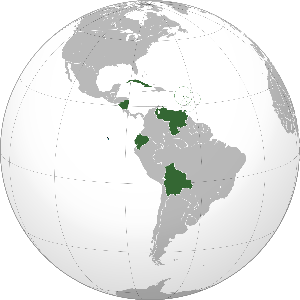- Member states of ALBA
-
Bolivarian Alliance for the Americas (ALBA) has eight member states.
When it was launched, ALBA had two member states, Venezuela and Cuba.[1] Subsequently a number of other Latin American and Caribbean nations have entered into this Peoples' Trade Agreement (Spanish: Tratado de Comercio de los Pueblos, or TCP) which aims to implement the principles of ALBA.
President Evo Morales of poor but natural gas-rich Bolivia joined the TCP on 29 April 2006, only days before he announced his intention to nationalize Bolivia's hydrocarbon assets.[2] Bolivia is a member of both UNASUR and ALBA, thus its attitude is crucial to relations between the two, says Marion Hörmann, since Bolivia is traditionally seen as a mediator between the Andean countries and the rest of South America. Regional Integration: Key Role for Bolivia. Venezuela and Ecuador are also members of UNASUR.
Newly elected President Daniel Ortega of Nicaragua signed the agreement in January 2007;[3] Venezuela agreed to forgive Nicaragua's US$31 million debt as a result. On 23 February 2007, Ortega visited Caracas to solidify Nicaragua's participation in ALBA.[4] However, Nicaragua is also a member of the Central America Free Trade Agreement (CAFTA).
Rafael Correa, the president of Ecuador, signed a joint agreement with Hugo Chávez, for Ecuador to become a member of ALBA once he became president.[5] Ecuador officially joined in June 2009.[6]
In January 2008, the Caribbean island nation of Dominica joined ALBA.[7]
In April 2009 Saint Vincent and the Grenadines was accepted as the seventh member of ALBA, while Grenada stated publicly that it was not yet ready to join the bloc.[8]
In June 2009, the Prime Minister of Jamaica said he would seek to address the future of the Caribbean Community (CARICOM) given the effects of ALBA and Trinidad and Tobago's proposed political union with the OECS on the Caribbean Community as the two main elements he says will have a "destabilising effect" on the Caribbean Community (CARICOM) bloc.[9]
Antigua and Barbuda, Ecuador and Saint Vincent and the Grenadines formally joined ALBA on 24 June 2009.[10]
On 25 August 2008, Honduran President Manuel Zelaya signed an agreement to join the ALBA, with a rally in front of the Presidential House that was attended by many of the presidents of the countries that are part of ALBA, including Chávez and Morales.[11] The Honduran congress – led by Roberto Micheletti,[12] who later became Zelaya's main political enemy, and president of the interim government after the 2009 Honduran coup d'état – approved ALBA on 9 October 2008.[13][14] On 16 December 2009, the Honduran congress met to withdraw the country from the ALBA, claiming a "lack of respect" from Venezuela since the country's joining in 2008, citing in particular Hugo Chavez' remarks about a potential invasion of Honduras to restore Manuel Zelaya to office, after he was removed on 28 June 2009 in the 2009 Honduran coup d'état. Withdrawal from ALBA was ratified by the Honduran Congress on 13 January 2010. Economic relations with Venezuela continue, including via Petrocaribe.[15]
Member states
Common name Official name Date joined Population Area (km²) GDP PPP (US$ bn) Capital  Antigua and Barbuda
Antigua and BarbudaAntigua and Barbuda 2009-06-24 85,632 442 1.546 St. John's  Bolivia
BoliviaPlurinational State of Bolivia 2006-04-29 9,119,152 1,098,581 43.424 La Paz  Cuba
CubaRepublic of Cuba 2004-12-14 11,451,652 110,861 108.2 Havana  Dominica
DominicaCommonwealth of Dominica 2008-01-20 72,660 754 .72 Roseau  Ecuador
EcuadorRepublic of Ecuador 2009-06-24 14,573,101 256,370 106.993 Quito  Nicaragua
NicaraguaRepublic of Nicaragua 2007-02-23 5,891,199 129,495 15.89 Managua  Saint Vincent and the Grenadines
Saint Vincent and the GrenadinesSaint Vincent and the Grenadines 2009-06-24 120,000 389 1.085 Kingstown  Venezuela
VenezuelaBolivarian Republic of Venezuela 2004-12-14 28,199,825 916,445 358.623 Caracas ALBA Totals 8 Countries – 69,513,221 2,513,337 636.481 Observer states
Observer states of the organisation are Grenada, Haiti, Paraguay, Uruguay and Syria.
References
- ^ Monthly Review, 2008-07-02, ALBA: Creating a Regional Alternative to Neo-liberalism?
- ^ "Leftist trio seals Americas pact". BBC News. 2006-04-29. http://news.bbc.co.uk/2/hi/americas/4959008.stm. Retrieved 2010-04-26.
- ^ Venezuelanalysis.com, 12 January 2007, Nicaragua Joins Venezuela in Regional Association and Cooperation Agreements
- ^ Prensa Latina
- ^ Venezuelan and Ecuadorian Presidents Seal Friendship with Joint Declaration | venezuelanalysis.com
- ^ "Ecuador to Officially Join the ALBA Agreement". Ministry of Foreign Affairs of Cuba. 2009-06-03. http://www.cubaminrex.cu/English/ALBA/Articulos/Press/2009/Ecuador.html. Retrieved 2009-06-21.
- ^ Fuller, Mike. "Dominica Joins ALBA Revolution". http://www.plenglish.com/article.asp?ID=%7B9D9EFB74-D8F5-493D-AC42-4A31C4B86D4D%7D)&language=EN. Retrieved 2008-01-28.
- ^ CARIBBEAN-ALBA-St.Vincent ready to join ALBA but Grenada is not, 21 April 2009
- ^ "UNDESIRED CONSEQUENCES: Golding says CARICOM under threat". Caribbean News Agency. 2009-06-10. http://www.cananews.net/news/131/ARTICLE/38630/2009-06-10.html. Retrieved 2009-06-23.
- ^ http://english.people.com.cn/90001/90777/90852/6683436.html
- ^ http://www.plenglish.com/article.asp?ID={572E71EE-08F1-4328-A8C2-83D8840AC033}&language=EN
- ^ [1]
- ^ Bajo presiones, Congreso ratifica adhesión a la Alba
- ^ [2]
- ^ El Tiempo, 13 January 2010, El Parlamento de Honduras ratifica su salida de la Alba
Categories:- Member states by organization
Wikimedia Foundation. 2010.

